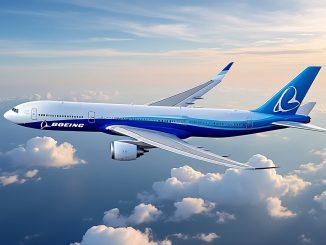- Boeing’s (BA) shares dropped 3.5% to $153.80 in premarket trading as China halted jet deliveries to its airlines – Air China, China Eastern Airlines, and China Southern Airlines – pausing 45, 53, and 81 planes scheduled for 2025-2027, in response to U.S. tariffs of 145% on Chinese goods.
- China’s ban on U.S.-made aircraft parts and equipment, alongside its 125% retaliatory tariffs, is set to raise maintenance costs for Boeing jets and may push Chinese carriers toward Airbus or COMAC.
- The escalating U.S.-China trade conflict, with over $650 billion in goods trade at risk, compounds Boeing’s challenges amid a slow recovery from a labor strike, supply chain issues, and a 737 MAX grounding in China since 2019.

Boeing (BA) faces mounting challenges as China’s decision to halt deliveries of its jets sent shares tumbling 3.5% to $153.80 in premarket trading. The move, reported by Bloomberg News, stems from escalating trade tensions, with Beijing responding to U.S. tariffs of 145% on Chinese goods by ordering its airlines – Air China, China Eastern Airlines, and China Southern Airlines – to pause receipt of 45, 53, and 81 planes, respectively, slated for delivery between 2025 and 2027. China, a critical growth market for Boeing where rival Airbus holds a stronger foothold, has also directed carriers to stop purchasing U.S.-made aircraft parts and equipment, a step likely to inflate maintenance costs for Boeing jets operating in the country.
The aerospace giant’s struggles are compounded by broader industry dynamics. A tariff war, intensified by U.S. supplier Howmet Aerospace’s (HWM) debate over cost allocation, has prompted planemakers, airlines, and suppliers to reassess contracts worth billions. China’s retaliatory tariffs of 125% on U.S. imports further threaten to make Boeing jets costlier for Chinese carriers, potentially pushing them toward Airbus or domestic manufacturer COMAC. This comes as Boeing navigates a fragile recovery from a labor strike, supply chain bottlenecks, and heightened regulatory oversight following a mid-air door panel blowout on a 737 MAX 9 last year, which contributed to a stock decline of over a third.
China’s aviation market has long been pivotal for Boeing, yet relations have been strained since the country grounded the 737 MAX in 2019 after two crashes claimed nearly 350 lives, suspending most orders and deliveries. Beijing’s latest measures, including exploring aid for airlines leasing Boeing jets to offset rising costs, signal a deepening rift. The broader U.S.-China trade relationship, with goods trade valued at over $650 billion in 2024, faces risks of stalling amid this tit-for-tat escalation. Boeing’s path forward hinges on navigating these geopolitical and operational headwinds while competing in a market increasingly tilted toward its rivals.
WallStreetPit does not provide investment advice. All rights reserved.
- Bulenox: Get 45% to 91% OFF ... Use Discount Code: UNO
- Risk Our Money Not Yours | Get 50% to 90% OFF ... Use Discount Code: MMBVBKSM
Disclaimer: This page contains affiliate links. If you choose to make a purchase after clicking a link, we may receive a commission at no additional cost to you. Thank you for your support!



Leave a Reply